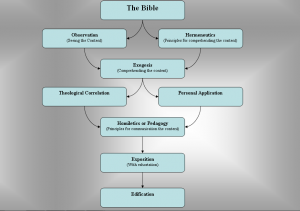
Return to Study Guide: How to Study the Bible, by Jeffrey Bruce and Brian D. Asbill
Download PDF (5 pages)
Module 10: Application
I. Thus far, we have looked at how to employ correct principles of interpretation in order to better understand the Bible. However, the process is incomplete until we actually make scripture a reality in our lives. As James says,
“But be doers of the word, and not hearers only, deceiving yourselves. For if anyone is a hearer of the word and not a doer, he is like a man who looks intently at himself and goes away and at once forgets what he was like. But the one who looks into the perfect law, the law of liberty, and perseveres, being no hearer who forgets but a doer who acts, he will be blessed in his doing.” (Jas 1:22-25).
II. A Few Important Considerations
A. Determine the original application(s) intended by the passage.
B. Evaluate the level of specificity of those applications (are they transferable across time and space to other audiences?)
C. If not, identify one or more broader cross-cultural principles that the specific elements of the text reflect.
D. Find appropriate applications for today that embody those principles.
E. Don’t forget the crucial role of the Spirit in applying the text to your life.
III. Interpretation and Application
A. In discussing interpretation it is important to keep in mind that these disciplines are part of a larger framework. Zuck’s diagram helpfully demonstrates this: Download PDF with GRAPH (5 pages)
B. As we see, the end goal is not interpretation, nor is it application. In reality, the end goal is that through correct interpretation and application you are able to build up the church. Thus, hermeneutics are not done in isolation, but in the context of the community.
C. Given that hermeneutics are done in the context of community, I would like to end with an exhortation; teach others what you have learned in this class. Correct interpretation is in many ways a prerequisite to spiritual transformation, and if you want to see those around you grow in their relationship with Christ, you must help them to study the Bible better. Hopefully this class has provided an impetus for you to do just that.
Return to Study Guide: How to Study the Bible, by Jeffrey Bruce and Brian D. Asbill
